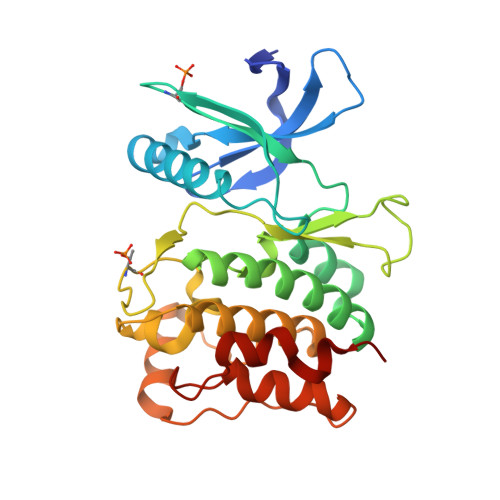Development of potent and selective ULK1/2 inhibitors based on 7-azaindole scaffold with favorable in vivo properties.
Morozova, A., Chan, S.C., Bayle, S., Sun, L., Grassie, D., Iermolaieva, A., Kalaga, M.N., Frydman, S., Sansil, S., Schonbrunn, E., Duckett, D., Monastyrskyi, A.(2024) Eur J Med Chem 266: 116101-116101
- PubMed: 38232465
- DOI: https://doi.org/10.1016/j.ejmech.2023.116101
- Primary Citation of Related Structures:
8SV9 - PubMed Abstract:
The UNC-51-like kinase-1 (ULK1) is one of the central upstream regulators of the autophagy pathway, represents a key target for the development of molecular probes to abrogate autophagy and explore potential therapeutic avenues. Here we report the discovery, structure-activity and structure-property relationships of selective, potent, and cell-active ULK1/2 inhibitors based on a 7-azaindole scaffold. Using structure-based drug design, we have developed a series of analogs with excellent binding affinity and biochemical activity against ULK1/2 (IC 50 < 25 nM). The validation of cellular target engagement for these compounds was achieved through the employment of the ULK1 NanoBRET intracellular kinase assay. Notably, we have successfully solved the crystal structure of the lead compound, MR-2088, bound to the active site of ULK1. Moreover, the combination treatment of MR-2088 with known KRAS→RAF→MEK→ERK pathway inhibitors, such as trametinib, showed promising synergistic effect in vitro using H2030 (KRAS G12C ) cell lines. Lastly, our findings underscore MR-2088's potential to inhibit starvation/stimuli-induced autophagic flux, coupled with its suitability for in vivo studies based on its pharmacokinetic properties.
- Department of Drug Discovery, H. Lee Moffitt Cancer Center and Research Institute, 12902 USF Magnolia Dr, Tampa, FL, United States.
Organizational Affiliation:





















